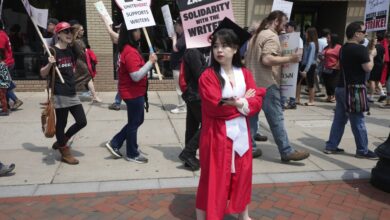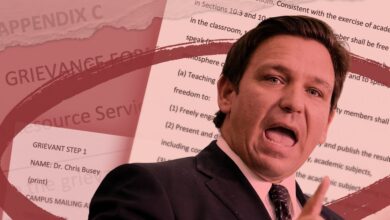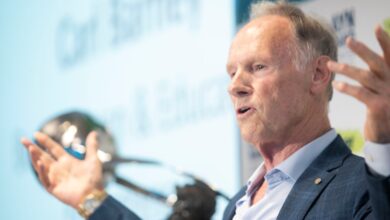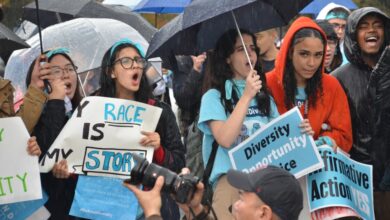Complaints of Muzzled Conservatives Are Behind New Laws. But Liberals Feel Stifled, Too.
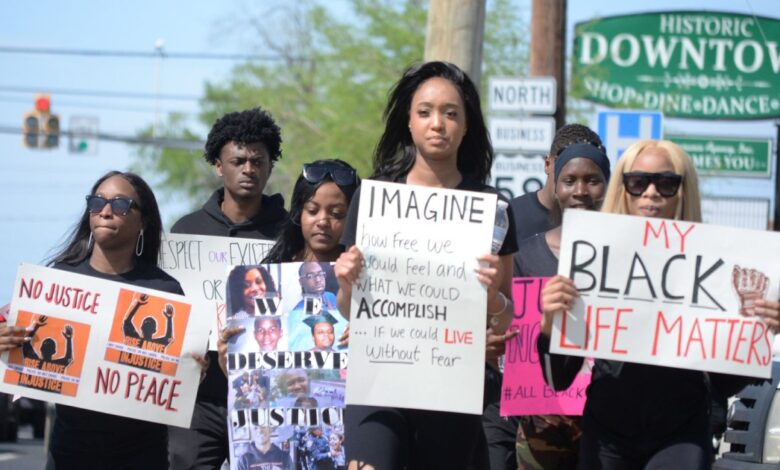
[ad_1]
Every year Seth Masket, a political-science professor and director of the Center on American Politics at the University of Denver, teaches a congressional-simulation class. In it, students represent the interests and make the arguments of current members of the U.S. Congress.
But in recent years, tensions have risen between classmates-turned-congressmen and -women. When this happens, Masket has had to intervene, explaining the line between accurately portraying a politician and attacking another student.
The behavior of some politicians — mainly Republican legislators, Masket said — makes this line hard to navigate. “I want them to be accurate, but I also don’t want them to be doing things like attacking people on the basis of their race or sex or sexual identity,” Masket says, referring to his students. The voices that often get shouted down in the classroom include first-generation students, students of color, and lower-income students, he says.
The charged political environment has made the class harder to pull off. “I’m fortunately not teaching that class this coming quarter, but it would be tricky if I did,” he said.
Republican lawmakers have in recent months enacted measures that require state colleges to keep a close eye on student expression. Gov. Ron DeSantis of Florida signed a law in June requiring all of the state’s public colleges to survey students, faculty, and staff members on intellectual freedom and viewpoint diversity.
One of the arguments implicit in this effort is a long-held one of many Republicans: that conservative speech is not tolerated on college campuses. But experts say political tensions — like those that have bubbled to the surface in Masket’s class — have served to suppress all sorts of speech. “It is a tense time on campuses,” said Amy Binder, a professor and chair of the department of sociology at the University of California at San Diego. “So I’m seeing it as more of a larger scale phenomenon than just the conservative students.”
Student activists demanding racial justice on campus find their expressions silenced routinely, sometimes violently.
A survey of nearly 20,000 college students conducted last year captured just how widespread that phenomenon is. Among all respondents, 60 percent said they felt they had to keep some opinions to themselves for fear of how they would be received. That includes 75 percent of students who identified themselves as “strong Republicans,” and also 63 percent of Black students. The survey was conducted by three groups, including the Foundation for Individual Rights in Education. In Indiana, the sponsor of a law similar to Florida’s cited the survey in his call for such a law, saying the problem of free speech at colleges existed “across the board.”
Gabrielle Harris, national president of College Democrats of America, says students have told her in recent months that they’re concerned about the goals and motives of these laws. “It’s not just trying to protect free speech, and if it is protecting free speech, whose free speech are we protecting?” said Harris, a political-science major at Stephen F. Austin State University.
Critics of the laws say they may encourage more harmful speech on college campuses, further divide students with different political affiliations, and chill the speech and expression of minority and other underrepresentedstudents.
Harris said that as a woman of color in Nacogdoches, a rural town, while she’s never been shy about speaking her mind, she has noticed differences on her campus with how administrators and professors confront peaceful protests for social justice and instances of hate speech.
When a group of young Black female students, returning from a pool party, were stopped by an off-duty police officer in Nacogdoches in 2019 and arrested, students marched in support of the women.
She said that the demonstrations on campus were met with heavy monitoring and criticism from some of the university’s professors and administrators, warning the students and telling them to be careful. Harris has noticed a less harsh reaction when other student groups come on campus and shout what she considers “hateful things” against minority groups like the LGBTQ community.
“If both of these forms of speech are protected, why is it that only one of the groups feels safe?” she said.
Some professors agree. “Activism is another form of speech in need of protection,” said Alyssa N. Rockenbach, a professor in the college of education
at North Carolina State University. “Student activists demanding racial justice on campus find their expressions silenced routinely, sometimes violently.”
She cited an incident at the University of North Carolina at Chapel Hill, in June, where students who refused to leave the closed session of a Board of Trustees meeting on the issue of tenure for Nikole Hannah-Jones were violently confronted by the university police. Julia Clark, a student protester, posted a photo of her bruised face on Twitter after the altercation.
“There’s just a lot of tentativeness on campus among a lot of different people, not just conservatives,” said Binder, the UC-San Diego professor.
In 2017, shortly after Donald J. Trump won the U.S. presidential election, Binder worked with Jeffrey L. Kidder, an associate professor in the department of sociology at Northern Illinois University, to explore the viewpoints and ideologies of politically active college students in what they identified as battleground states (Arizona, Colorado, North Carolina, and Virginia) for their forthcoming book, The Channels of Student Activism: How the Left and Right Are Winning and Losing in Campus Politics Today. They found that conservative and liberal students had completely different views of speech rights. Students, they found, were more concerned about criticism from other students about their opinions than they were with professors or other faculty members.
“We certainly found pretty notable differences in how progressives and conservatives framed the issues of speech rights,” said Kidder.
Conservative students, he said, frequently brought up free speech as a key concern. Progressive students he interviewed didn’t broach the topic as much but were more concerned with hate speech, for which they had a far more expansive definition than did their conservative peers.
Matthew Mayhew, a professor of educational administration at Ohio State University, said it’s up to the faculty to create an environment that encourages free speech for all students. For him, professors and other faculty members are responsible for creating an environment within the classroom that encourages discussions “with a tenor and an affect that’s inviting, that’s kind, that’s civil, and that’s generous.”
[ad_2]
Source link



